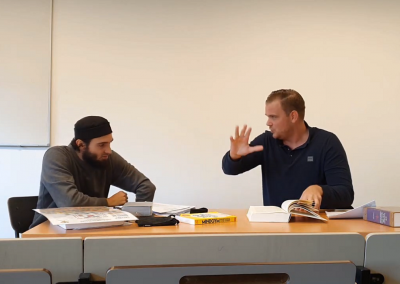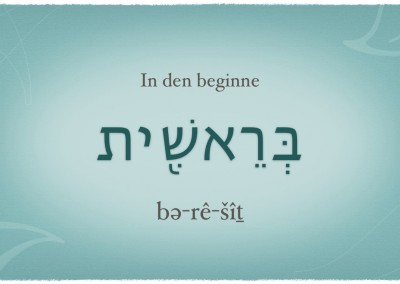“Force them to the side of the Road”
Islamic Humiliation of Jews and Christians
or Pragmatism in Times of War?
[scroll down for the written presenation]
“Force them to the side of the Road”
Islamic Humiliation of Jews and Christians
or Pragmatism in War times?
Today we will discuss a recent article on discover-the-truth.com, a website claiming to be dedicated to refuting bigotry and short-sightedness through which Christians and Orientalists are “consistently attacking” their Islamic beliefs. We will investigate their claims concerning an infamous command by Muhammad from which it appears that Muslims have to impose a humiliating form of social conduct on Jews and Christians whenever they meet them on the roads of an Islamic country. The first two ahadith mentioned by Discover the Truth (DTT) are usually brought forth by critics of Islam. The first one reads as follows:
“Abu Huraira reported Allah’s Messenger as saying: Do not greet the Jews and the Christians before they greet you and when you meet any one of them on the roads force him to go to the narrowest part of it.”
(Sahih Muslim Book 26, Hadith 5389. Eng. Tran., https://sunnah.com/muslim/39/16)
And:
“Narrated Abu Hurairah: that the Messenger of Allah said: “Do not precede the Jews and the Christians with the Salam. And if one of you meets them in the path, then force them to its narrow portion.”
(Jami at-Tirmidhi volume 5, Book 40, Hadith 2700. Eng. Tran., Sahih Darussalam, https://sunnah.com/tirmidhi/42/13)
The author, Kaleef Karim, emphasizes that he always tells fellow Muslims to study the historical context of any hadith in order to prevent distortion. Therefore he provides two other ahadith which, according to him, describe the very same event but with more insight into the historical context:
“It was narrated from Abu ‘Abdur-Rahman Al Juhani that the Messenger of Allah said: “I am riding to the Jews tomorrow. Do not initiate the greeting with them, and if they greet you, then say: Wa ‘alaikum (and also upon you)”.
(Sunan Ibn Majah volume 5, Book 33, Hadith 3699. Eng. Tran., Hasan Darussalam https://sunnah.com/ibnmajah/33/43)
And here:
“Abu Basra al-Ghifari reported that the Prophet, may Allah bless him and grant him peace, said, “I will ride to the Jews tomorrow. Do not give them the greeting first. If they greet you, then say, ‘and on you.’”
(Al-Adab Al-Mufrad Book 44, Hadith 1102. Eng. Tran., Sahih Al-Albani, https://sunnah.com/adab/44/2)
The author claims that the last narrations deal with the same saying of Muhammad as the first two. With this he wishes to prove that the context of warfare also applies to the narrations which do not mention warfare. However, he doesn’t prove that these are the same narrations anywhere. He simply states this and then builds his entire argumentation on this assumption. But the careful reader observes significant differences between both versions. The war-variant doesn’t mention anything about Christians or having to force anyone to the side of the road.
The fact that Christians are not mentioned in the war-variant makes sense because it clearly concerns a conflict with Jews. So what about the motivation to not greet Christians first and force them to the side of the road? The author is completely silent on this evident problem in his reasoning. He jumps from one hadith which deals with Jews and Christians to a narration about Jews and conflict. From there he takes off and never looks back, leaving careful readers behind with their questions.
So, the war-variant doesn’t concern Christians or forcing people to the side of the road. This excludes the possibility of both variants describing the same event. But even if they did, then still the author’s conclusion remains a mere assumption. You see, just because something occurred during wartime, doesn’t mean it may only occur in wartime, unless the person who made the rule, which in this case would be Muhammad, specifically stated this. The fact is that scholars of Islam don’t even say this even though that is exactly what the author of DTT tried to have us believe when he wrote: “It is quite clear that among classical scholars of Islam, they deemed this Hadith report to be in relation to war only.” In the remaining paragraphs of this article we shall determine whether this claim can still be made after careful study of the sources used by DTT.
One explanation the author didn’t mention, but which is often heard, is that Muhammad refused to greet the Jews first because they sometimes greeted him by saying “Death be upon you” after which Muhammad said “And upon you”. However, this is another topic entirely and, as you can see, again has nothing to do with rules on how to greet Christians or force anyone to the side of the road.
We’d love to hear from DTT what the evidence is for the statement that both narrations describe the same event. For now we have to conclude that their refutation of critics claims is based on an unfounded assumption and a fallacious conclusion even if their assumption were to be based on solid evidence. We continue to review the article.
The books in which the ahadith are found
The author of DTT tries to further cement his argument by pointing his readers to the book titles in which the ahadith on Christians and Jews are sometimes found. For instance, elsewhere in Jami’ at-Tirmidhi it is found in “the Book of Military Expeditions” as hadith number 1602. He also found it in the collection of Ibn Hajar al-Asqalani in the book “Jihad”.
However, there are a number of problems with this line of reasoning. First and foremost it really stands out that he only shares two cases in which the hadith was placed in books on war. Why does he ignore the many other mentions of this hadith to which he himself referred earlier? This question is quickly answered when we look the narrations up.
The very first hadith in their article is from Sahih Muslim and is found in “the Book of greetings”. The narration quoted after that (Tirmidhi 2700) is found in “the Book of Seeking Permissions (and chapters on manners)”. Even the war-variant, of which the author claims it describes the same event, is found in Sunan ibn Majah in “the Book of Etiquette”. And in Al-Adab Al-Mufrad it is found in “the People of the Book”.
From this it is clear that the author has given his audience a distorted overview of the sources. Something he accused other of doing, mind you. It seems highly unlikely that these facts have escaped the author’s attention since he has quoted from the same books within the same volumes.
According to his reasoning, finding any narration in a book on Jihad twice is sufficient evidence to conclude that it can only be applied to Jihad. We’ve already discussed the fallacy in this argument. And now that we have found the narration in books on etiquette and how to greet people in general, we need only follow through on the author’s reasoning in order to prove the inconsistency of his argument.
An interesting side note is the unusual permissiveness surrounding the meaning of Jihad. Those of us who encounter Muslims regularly in theological discussion are familiar with their frequent denial of the idea that Jihad usually points to warfare in Islam’s primary sources. Critics of Islam would hear them say that Jihad “mostly” or even “exclusively” refers to an inner struggle. However, in the article we are reviewing today, it is suddenly no question that “Jihad” refers to war whenever it is found in the titles of many chapters and books in Islam’s most trusted hadith collections. This is particularly striking because the author himself once wrote an article about the different meanings of Jihad, in which he evades this emphasis on warfare. Besides that, he is completely silent on the fact that it can also refer to offensive war, which our regular readers know is part of Islam.
Commentaries in the books the author has seen
Let’s go back to the volumes from which the author quoted the narrations. We feel that the facts we’ve stated so far should have moved him towards a sincere study of the commentaries in the books of Darussalam, from which he claims to have taken his quotes. Since he hasn’t, we will gladly correct this negligence towards his brothers and sisters.
When we look for the Tirmidhi hadith which the author, to his joy, found in the book of military expeditions, we find that the added commentaries by both Abu Isa Tirmidhi himself and Al-Mubarakpuri were left out of the article on DTT. When we read them, we quickly understand why that is. Here’s the first commentary from the exact same book DTT referred to:
“[Abu ‘Eisa said:] This Hadith is Hasan Sahih. And regarding the meaning of this Hadith: “Do not precede the jews and the Christians”: Some of the people of knowledge said that it only means that it is disliked because it would be honoring them, and the Muslims were only ordered to humiliate them. For this reason, when one of them is met on the path, then the path is not yielded for him, because doing so would amount to honoring them.”
(Jami at-Tirmidhi volume 3, Book 19, Hadith 1602 Eng. Tran., Sahih Darussalam 2007, page 365)
In this commentary there is not a single reference to a context of warfare. We do clearly see that the hadith is fully placed in a category of general dealings with Jews and Christians. Please be aware that this commentary is placed right below the hadith itself and that both are part of the chapter called “What has been related about greeting the People of the Book with Salam”.
On the very next page of this book follows a quote by the respected scholar Abdur-Rahman Al-Mubarakpuri from his well-known Tirmidhi-commentary Tuhfat al-Ahwadhi:
“In normal conditions when Muslims are in power and they are not living as a minority, and they are not under any compulsion or subjugation, it is an order for Muslims that they should not give such leeway to the non-Muslims and they should not greet them first nor yield the way for them.
[..]
In a country where Muslims are living as a minority, they are allowed to give such leeway to non-Muslim rulers for the greater interest of the Muslim community. (Tuhfat al-Ahwadhi v.2 p.397.)”
(Jami at-Tirmidhi volume 3, Darussalam 2007, pagina 366)
From these commentaries it becomes clear what the real context of the narration is, according to the source used by DTT. To us, this all comes across quite deceptive. A rule that says you are allowed to act friendly towards non-Muslims but then spins 180 degrees as soon as a period of dominance arises? How sneaky! But we can’t deny that this is exactly what the Islamic sources and their most trusted commentators say. These important sources are only half shown to Muslims when an Islamic apologist tries to “help” them. It is clear that the author of DTT has seriously bended the truth. Therefore it seems to be no coincidence that we have just read the same deceptive characteristic in Mubarakpuri’s commentary.
As you know there were several other places where the Muslim author collected his hadith quotes. We did the same check with these narrations concerning the book titles and the commentaries. This is the overview we made for your convenience:
Jami’ at-Tirmidhi, book 40, hadith 2700
This was the second mention of the hadith without a context of war. We find this narration in the chapter called “What has been related about it being disliked to give the Salam to the Dhimmi”. Again, we discovered a commentary which the author of Discover the Truth omitted:
“Saying Salam is a means to express honor and respect to others and paying respect and honor to the non-believers, thus, this is not correct; if a disbeliever comes across a path, he should not be given the right of way rather he should be forced to walk on the side of the road so that he does not regard himself honorable and respectable.”
(Jami’ at Tirmidhi, volume 5, Darussalam 2007, page 93)
So what is the reason for this humiliation? The answer from this commentary is simply the fact that they are non-Muslims, since such people have to be humiliated. Period. Greeting them first means to ascribe a certain honor to them which they do not deserve. The same goes for the reason why non-Muslims must be forced to the side of the road. Not because there is a situation of war; not because the Jews were mean by saying “Death upon you” but simply in order to make sure that non-Muslims do not feel themselves honored or respected. Because their place, according to Islam, is one of subjection.
This view reminds us of Surah 9 verse 29 in the Quran which describes how Jews and Christians are supposed to pay their Jizya tax. The verse says: “…until they pay the Jizya with willing submission and feel themselves subdued.”
Sunan Ibn Majah, book 33, hadith 3699
This was the author’s first mention of the war-variant. In the volume published by Darussalam this hadith is placed in the book called “Returning (the greeting of) Peace to Ahludh-Dhimmah”. The explanatory footnote with that last term says “Non-Muslims living under the protection of an Islamic government.” (Sunan Ibn Majah, volume 5, Darussalam, 2007, page 31).
Here the same is clearly shown: the humiliating manners apply to all Dhimmies and have nothing to do with any criterion of war. In fact, Dhimmies only become Dhimmies after they have been conquered and war with them has come to an end.
Sahih Muslim, book 26, hadith 5389
This was their first mention of the hadith, which refers to Jews and Christians without a context of warfare. As stated earlier, this narration is found in “the Book of Greetings” or “the Book of Salam”. The chapter then is called “The Prohibition of initiating the greeting with the People of the Book, and how to respond to them” (Sahih Muslim, volume 6, Darussalam 2007, page 21).
Again, things are very clear. This hadith is equally presented as a general instruction to apply humiliating manners on Jews and Christians. It is found in a book which focusses on how to treat people of different groups. It says nothing about a temporary tactic in days of war.
Quran commentary by Ibn Kathir
To retire the modern interpretation by websites like DTT completely, we will now zoom in on Surah 9 verse 29 of the Quran:
“Fight those who do not believe in Allah or in the Last Day and who do not consider unlawful what Allah and His Messenger have made unlawful and who do not adopt the religion of truth from those who were given the Scripture – [fight] until they give the jizyah willingly while they are humbled.”
(Sahih International translation)
The verse immediately tells us that those who were given the Scripture, which refers to Jews and Christians, are to be subjected as a general rule. Stories about a battle of Tabuk can be left for other discussions. We know this theory of self-defense and reject it on the basis of its weak argumentation. The verse right after even teaches us why Allah curses the Jews and Christians: it is because of what they believe, not because of their attitude towards Muslims.
Let’s look at the most relevant part of this verse and see what one of Islam’s most trusted commentators wrote to explain it. Concerning the last words of the verse (“and feel themselves subdued”) Ibn Kathir wrote:
“(and feel themselves subdued.), disgraced, humiliated and belittled. Therefore, Muslims are not allowed to honor the people of Dhimmah or elevate them above Muslims, for they are miserable, disgraced and humiliated. Muslim recorded from Abu Hurayrah that the Prophet said, لَا تَبْدَءُوا الْيَهُودَ وَالنَّصَارَى بِالسَّلَامِ، وَإِذَا لَقِيتُمْ أَحَدَهُمْ فِي طَرِيقٍ فَاضْطَرُّوهُ إِلَى أَضْيَقِه (Do not initiate the Salam to the Jews and Christians, and if you meet any of them in a road, force them to its narrowest alley).”
As you can see, Ibn Kathir himself points us in the direction of the debated hadith. As expected he nowhere mentions a context of war in which these manners should only be utilized. In fact he too calls these Jews and Christians Dhimmies, which can only refer to a time after the war is settled and the defeated people have subjected themselves to their Islamic rulers.
According to this commentator, who wrote several centuries after the time of Muhammad and the war that supposedly provides the context for the hadith in question, Jews and Christians are lower than Muslims. Not only that, they are “miserable, disgraced and humiliated”. The general application on all Jews and all Christians can hardly be more obvious than this. You may be surprised to learn that this book is for sale everywhere. Muslims who are susceptible to what is commonly referred to as “radicalization” can be easily influenced by works like these. And it doesn’t help that these words seem to support statements found in both the Quran and the most trusted hadith collections and were written by mainstream Islamic heavyweights among the scholars and not by salafis or wahabis, as the media often likes to suggest.
The Quran also confirms that Muslims must take this superior position when their numbers or their strength offers the opportunity. We read about that in Surah 47 verse 35:
“Be not weary and faint-hearted, crying for peace, when ye should be uppermost: for God is with you, and will never put you in loss for your (good) deeds.” (Yusuf Ali)
The Pact of Umar
Apart from the clear reference to the debated hadith as a general rule on how to engage Jews and Christians socially, Ibn Kathir’s commentary also points us towards the Pact of Umar. This is a set of rules which Umar bin Al-Khattab, the second successor of Muhammad, imposed on Christians after conquering their territory with his army. Modern Islam apologists will try to obscure this source as well by suggesting it is not authentic and that there is another, more peaceful Pact of Umar. The evidence for this pact, however, is flimsy to say the least. It can be no surprise that this other pact rose to fame only in modern days, when apologetic answers to Western audiences began to bare a fitting solution for the obvious problem.
We shall navigate through the Pact of Umar with you, as quoted by Ibn Kathir in his commentary on the Quran.
We point out that Ibn Kathir describes this document as Umar’s “well-known conditions … that ensured their continued humiliation, degradation and disgrace.” This is why this document was an excellent source for Ibn Kathir to illustrate the already mentioned ayah and hadith with a practical example from early Islamic history.
Some of the conditions the Christians had to agree to were:
“We will respect Muslims, move from the places we sit in if they choose to sit in them.
We will have the front of our hair cut.
We will wear belts around our waist.
We will neither erect in our areas a monastery, church, or a sanctuary for a monk.
We will not restore any place of worship that needs restoration nor use any of them for the purpose of enmity against Muslims.
We will refrain from erecting crosses on the outside of our churches and demonstrating them and our books in public.
Those Muslims who come as guests, will enjoy boarding and food for three days.
We will not prevent any Muslim from resting in our churches whether they come by day or night, and we will open the doors of our houses of worship for the wayfarer and passerby.
We will not invite anyone to Shirk (ours: this is the incorrect view which Muslims have of the Christian faith).
We will not prevent any of our fellows from embracing Islam, if they choose to do so.
We will not sound the bells in our churches, except discretely, or raise our voices while reciting our holy books inside our churches in the presence of Muslims, nor raise our voices with prayer at our funerals.
We will not bury our dead next to Muslim dead.
We will not buy servants who were captured by Muslims.
We will be guides for Muslims and refrain from breaching their privacy in their homes.
If we break any of these promises that we set for your benefit against ourselves, then our Dhimmah (promise of protection) is broken and you are allowed to do with us what you are allowed of people of defiance and rebellion.”
We smile in the faces of some, but …
Finally, we will focus on another verse in the Quran in order to provide more clarity on the xenophobia Muslims are to have towards Jews and Christians, according to their religion.
“O ye who believe! take not the Jews and the Christians for your friends and protectors: They are but friends and protectors to each other. And he amongst you that turns to them (for friendship) is of them. Verily God guideth not a people unjust.”
(Surah 5 verse 51, Yusuf Ali)
The same meaning is found in Surah 4 verse 144 and Surah 3 verse 28 concerning “the unbelievers” in general.
What we read in Ibn Kathir’s commentary on this verse is again alarming:
“Allah forbids His believing servants from having Jews and Christians as friends, because they are the enemies of Islam and its people, may Allah curse them.”
Just as the names of respected Muslims are often coupled with saying “may Allah bless him”, the Jews and Christians are given the additional “may Allah curse them” which is also commonly heard when Muslims refer to Satan. The Quran itself confirms this in Surah 9 verse 30 where it says “Allah’s curse be upon them!” about all Christians who believe Jesus is the Son of God. The fact that such a curse is part of Islam cannot be denied, therefore Ibn Kathir cannot be condemned by modern Muslims for repeating it in an attempt to speak as Islamically as he can.
This commentary continues by pointing towards a hadith wherein Umar commands Abu Musa to drive a Christian scribe from their area, purely and solely because he was a Christian. In fact he was a useful Christian to Abu Musa but had to be driven out regardless.
For Surah 3 verse 28 we read the following commentary by Ibn Kathir:
“Allah prohibited His believing servants from becoming supporters of the disbelievers, or to take them as comrades with whom they develop friendships, rather than the believers.”
According to Ibn Kathir Muslims cannot show support to Jews and Christians nor can they become friends with them.
Unless:
“(unless you indeed fear a danger from them) meaning, except those believers who in some areas or times fear for their safety from the disbelievers. In this case, such believers are allowed to show friendship to the disbelievers outwardly, but never inwardly. For instance, Al-Bukhari recorded that Abu Ad-Darda’ said, “We smile in the face of some people although our hearts curse them.” Al-Bukhari said that Al-Hasan said, ‘The Tuqyah is allowed until the Day of Resurrection.’“
As you can see, we’ve just read the same split tongue approach as found in the commentary of Tirmidhi’s collection. It prescribes the same contrast between times of sufficient strength and times of weakness.
The fact that Muslims are called to treat non-Muslims very differently than fellow Muslims is confirmed quite straightforwardly by the description of Muslims in the Quran: “…those who are with him (Muhammad) are strong against Unbelievers, (but) compassionate amongst each other…” (Surah 48 verse 29). This verse answers in some ways how non-Muslims are to recognize true Muslims when they meet them in their times of dominance.
Ibn Kahthir points to a specific narration which says that Muslims smile in the face of some while cursing them inside. According to the narration this deception has a name, which is Taqiyya, and is allowed until the Day of Resurrection. So whenever a Muslim tells you that Taqiyya is no longer to be applied in Islam today, you’ll know that in that moment Taqiyya is being applied, either because the Muslims who’s talking to you is applying it or because he is ignorant of these facts in which case he is the victim of the Taqiyya of his own teachers.
Perhaps you’d say it is not so deceptive at all to save yourself in times of physical danger by telling a white lie. But is that all Taqiyya can be used for? What about for instance an imam in the West who openly teaches that adultery, apostasy and homosexuality must be answered with the death penalty? It has been proven that such imams have been prosecuted and or deported. Therefore, would the application of Taqiyya not resolve this problem and help the greater purpose of the Muslim community?
In fact, if we turn to the primary sources of Islam one more time, we find instances in which lies were told in order to get close to someone so they can be murdered. This was certainly the case for Kaab bin al-Ashraf, a Jew who had insulted Muhamad and was eagerly murdered for it by one of his followers. The killer had Muhammad’s permission to use a lie in order to lower the victim’s defenses. This was a moment in which the follower of Muhammad smiled in the face of a non-combatant Jew but cursed him in his heart, while he himself was in no physical danger.
Final thoughts
When faced with the challenge of finding out what the authentic social rules of Islam are, it is wise to determine who we should listen to. Do we take the words of people who live 1400 years after Muhammad under a Western government? Or do we listen to the instructions of people who Muhammad himself knew, people who have collected many of the primary sources of Islam and people who have succeeded Muhammad as the leader of all Muslims during the first decades of Islam?
At this point we should stress that by we no means wish to suggest that all Muslims will behave this way towards Jews and Christians. In fact most Muslims seem to be kind. But their leaders, who carry out the rules of conduct prescribed by Allah and his messenger Muhammad, can easily come to the conclusion that all of the above applies to their manners as soon as they can.
The facts in this study show the alarming intentions of Islamic manners as they are to be imposed on Jews and Christians. They were (and at times still are) truly subjected people who had to realize through constant humiliation that they were not first degree citizens. And the reason for that was because of their inferiority to Muslims. Of course similar practices were not uncommon in those days. On some occasions during the Middle Ages Christians too have, elsewhere in the world, mistreated others. But any honest discussion there, will always encompass the behavior of random Christians living centuries after Christ.
It must be understood by both the Christian reader, who perhaps at times struggles to counter Islamic claims – and the Muslim who may feel confused by arguments on both sides – that the founder of any religion has the unique chance of settling the debate forever on issues such as the social conduct towards people of other beliefs. Jesus Christ gave us his set of rules, for instance when He said: “In all things treat others as you yourself wish to be treated, that is the essence of the Law and the Prophets” (Matthew 7:12). Bible scholars often refer to this as “the golden rule of all justice” and can be found in the Old Testament as well, like in Leviticus 19:33-34. The manners Muhammad and his companions left behind for their Ummah contradict the teaching of Jesus and therefore cannot come from the same source.
But most importantly, Muhammad’s rules of conduct will always be the long reaching arm from history that has the ability to instill hatred and bigotry in the hearts of new followers of Allah. Knowing this, it may not be a surprise that the annual World Watch List provided by opendoorsusa.org ranks mostly Muslim countries as those in which the persecution of Christians occurs.
It is clear that Discover the Truth has been playing hide and seek with the truth for so long that both haven’t met in a long time. To us it is unthinkable that someone could write an article, aiming to refute so called distortions while abusing the sources themselves. It is no surprise that even Muslims from time to time criticize Discover the Truth.com for their random use of Islamic scripture.
Unfortunately we have to conclude once again that Muslims who seek to study their religion in all honesty end up reading articles like the one we’ve discussed here today. Islamic spokesmen already have a bad reputation because of the things many have said in front of a Western audience which turned out to be demagoguery at best. And because of this, more and more people are confused as to when they are being lied to and when the truth is presented to them.



















![Shabir Ally’s mathematical miracles debunked [HD]](https://deovolentenl.nl/wp-content/uploads/2015/11/shabir-english-400x284.jpg)












![Deo Volente NL in gesprek met Maiwand al Afghani [deel 1]](https://deovolentenl.nl/wp-content/uploads/2015/07/mai-2.jpg)
![Deo Volente NL in gesprek met Maiwand al Afghani [deel 2]](https://deovolentenl.nl/wp-content/uploads/2015/07/mai-1.jpg)
![Deo Volente NL in gesprek met Maiwand al Afghani [deel 3]](https://deovolentenl.nl/wp-content/uploads/2015/07/mai-5.jpg)
![Deo Volente NL in gesprek met Maiwand al Afghani [deel 4]](https://deovolentenl.nl/wp-content/uploads/2015/07/mai-3.jpg)